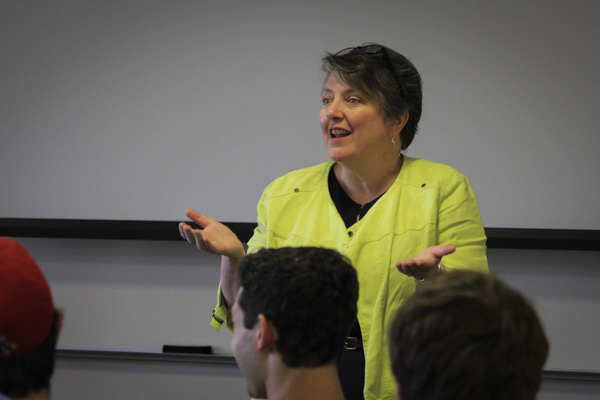A new sustainability course this semester will connect students with experienced and influential speakers on climate change.
Kathleen Merrigan, the University’s executive director of sustainability, will lead the course on climate change, alongside executives at the Center for Climate and Energy Solutions. The new class will introduce students to policies to combat climate change by bringing in the people who regularly work on the topic.
Members from the center — an Arlington, Va.-based nonprofit that advocates for addressing climate change and other sustainable causes — will provide their insights on climate change policy.
Merrigan said that because the course is co-taught by individuals who focus on climate change advocacy, students can more clearly see how to apply concepts from class to their careers.
“It’s really about elevating the discussion and pinpointing the real issues are that people need to really kind of tackle in new and innovative ways,” she said.
The course, titled “Climate Change and Policy,” follows the tag-team teaching style set out in “The Sustainable Plate” and “The Sustainable City,” courses launched last spring that are taught by more than one professor and from different perspectives.
Michael Svoboda, the sustainability minor director and an assistant professor of writing, said in an email that the new course “completes our suite of interdisciplinary, team-taught sustainability courses at the undergraduate level.”
The department is not planning on launching any other collaborative courses yet because the current offerings reflect the existing strengths among the department’s faculty, Svoboda said.
Merrigan tapped Bob Perciasepe, the president of the Center for Climate Change and Energy Solutions, to help teach the course. Perciasepe was the deputy administrator of the Environmental Protection Agency during the first six years of U.S. President Barack Obama’s administration, according to the organization’s website.
Merrigan said she met Perciasepe during her time as the U.S. deputy secretary and chief operating officer of the U.S. Department of Agriculture, a role she had from 2009 until she came to GW in 2014.
Other executives at the Center for Climate Change and Energy Solutions will also have a hand in teaching the course. Elliot Diringer, was who called one of the “foremost people behind the climate change negotiations” during the United Nations Climate Change Conference held in Paris last year, will give lessons to students that focus on international policy for climate change, Merrigan said.
About 30 students from several of GW’s schools are enrolled in the course, which meets once a week, Merrigan said. The three-credit course also counts toward the University’s minor in sustainability, which launched in 2012.
“Not only are we having a team of faculty who come from different walks of life — it’s great to have students in that same kind of mix,” Merrigan said.
Brooke Migdon, a sophomore who has not yet declared her major, said she enrolled in the course to help decide her academic interests.
She said climate change doesn’t have just one “culprit,” so having instructors who can speak to each facet with their own specific expertise gives students a more holistic view of the course material.
“I’ve never had a course taught by a group before, and I think [with] a topic such as this, it’s so important because there are so many facets of environmental science and sustainability,” she said.







